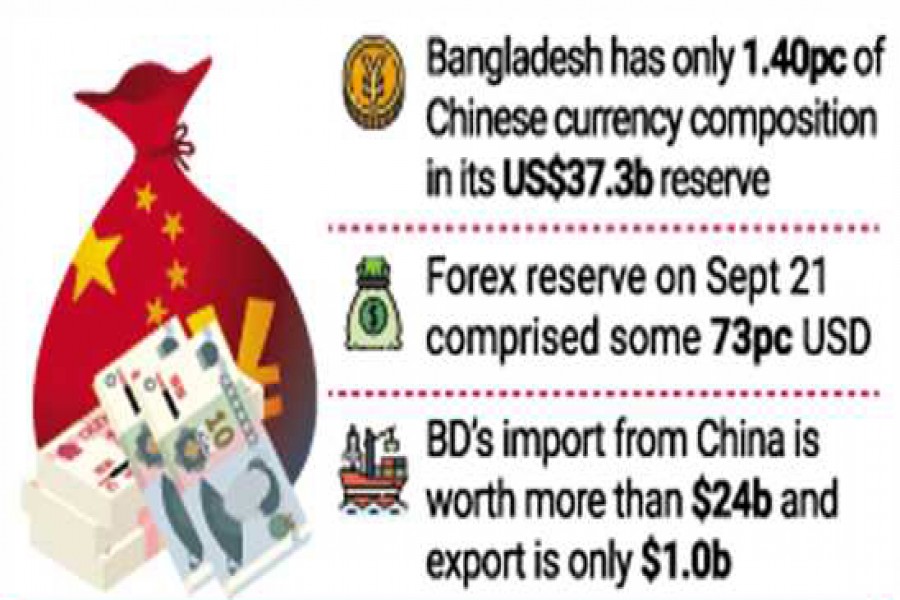Allowing the Chinese currency for international trade would help Bangladesh little in decreasing dependence on the US dollar due to negligible yuan reserves and also currency-conversion risks, analysts say.
The prospect of cross-border trade through the Chinese yuan (CNY) or reinminbi is dim as Bangladesh has only some 1.40 per cent of Chinese currency composition in its US$37.3-billion reserves, they add.
Besides, they said Saturday, currency-conversion risks for the banks and the businessmen will also affect the yuan transaction.
The analysts further said the State Bank of India (SBI)'s recent advice to Indian businessmen in settling deals with Bangladeshi businesses in Indian Rupee (INR) instead of US dollar may also not bring any benefit to Bangladesh too.
The Bangladesh Bank (BB) on September 15 allowed local banks to maintain accounts in Chinese yuan with their corresponding lenders or branches abroad to enable local businesses to settle transactions for foreign trade using the currency.
Besides, the State Bank of India in August last asked Indian exporters to avoid settling deals with Bangladesh in the US dollar and other major currencies as it looks to curb exposure to Dhaka's falling reserves, Indian media reported.
Bangladesh uses mainly the US dollar for payments in international trade as the country's foreign- exchange reserves are heavily dependent on the US currency.
According to the central bank, Bangladesh's forex reserves on September 21 stood at $37.3 billion which comprised some 73-percent USD while the remaining currencies were euro, pound sterling etc.
"Since Bangladesh's trade imbalances with China and India are massive, the foreign trading in yuan or Indian rupee (INR) will be difficult," says one analyst.
Besides, the currency- conversion risks will affect the CNY and INR transaction for the Bangladeshi businessmen.
According to the Bangladesh Bank (BB), Bangladesh imported Chinese products worth US$24.09 billion in 2021 calendar year while exported goods worth only some $1.0 billion.
Bangladesh exported goods worth $1.00 billion to India while imported products worth $8.59 billion in the FY2021, the central bank data show.
Former World Bank (WB) lead economist Dr Zahid Hussain told the FE that the BB move in settling cross-border trade in yuan would not bring benefit to Bangladesh.
The huge imbalance in trade between Dhaka and Beijing is the key reason for the impediments to yuan transactions, he said.
Allowing Chinese currency for international trade will boost Bangladesh's position in the Ease-of- Doing- Business Report of the World Bank Group, but the cross-border trade in yuan will be difficult in the short and mid terms, he added.
"Bangladesh's businessmen usually import from China and export to other destinations. So, it is difficult for them to balance the currency transactions. If they receive yuan against export and pay the same currency for their import payments, then they could use the yuan in their foreign trade. Rather they will not go for the risk," Dr Hussain said.
Besides, the banks maintaining accounts in yuan with their corresponding lenders or branches abroad to enable local businesses to settle transactions for foreign trade using the Chinese currency will also not take the risk of yuan purchase from the Chinese market in exchange for USD for the current conversion risk, he added.
Neither any commercial banks nor any importer or exporter will take the two-time currency -conversion risks, the former WB economist thinks.
It could be possible if there were not export and import imbalances with China and India, Dr Hussain said.
Policy Research Institute (PRI) Executive Director Dr Ahsan H Mansur says since Bangladesh has not adequate yuan reserves, the BB move might not cut dependence on the USD in the shorter term.
"When Bangladesh's import from China is worth more than $24 billion and export is only $1.0 billion, then how the trading through yuan is viable for the businessmen and the banks! In real sense it is not possible," he told the FE.
A BB high official, requesting anonymity, however, said they had just opened up the yuan era for cross-border trading which can bring a good result for the country.
"In 2018, the central bank opened up the Chinese yuan for cross-border trading. But that had not brough yet a good result due to an ambiguity in the previous circular. But this time, we are hopeful of getting some benefit," he said, adding it may take some more time for the expected output.
Earlier on August 14, 2018, the central bank allowed the AD banks to open foreign-currency clearing account with the BB in the CNY on the same grounds.
The banks had earlier been allowed maintaining foreign-currency clearing accounts with the central bank in the US dollar, Pound Sterling, Euro, the Japanese Yen and the Canadian dollar, Australian dollar and Swiss Franc.
"Local importers may purchase goods at cheaper prices from China using such payments mechanism," another BB official told the FE about the merit of their move.
Under the latest BB policy, the importers from Bangladesh are allowed to settle their import-payment obligations with all convertible currencies, including the Chinese one-also named Renminbi (RMB)--the central banker added.
He noted that the International Monetary Fund (IMF) had already included the Chinese currency in its currency basket - SDR (special drawing rights).
The value of SDR is based on the exchange rates of five major currencies - the US dollar, Euro, Yuan, Japanese Yen, and British Pound Sterling, according to the central banker.
Earlier, the Metropolitan Chamber of Commerce and Industry, Dhaka (MCCI) had suggested the central bank should consider using a second currency, other than the US dollar, for foreign trade.


